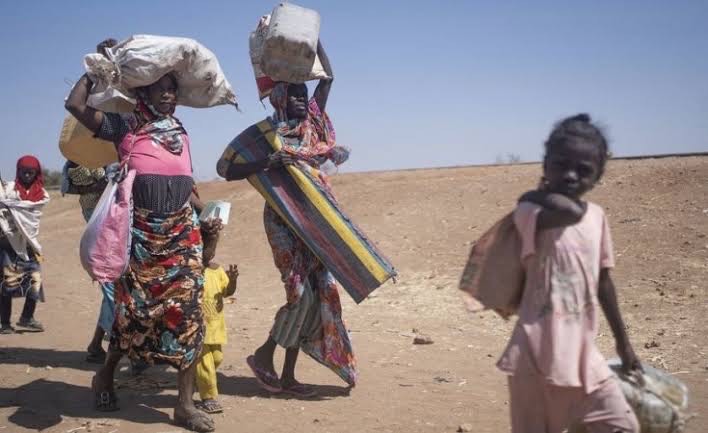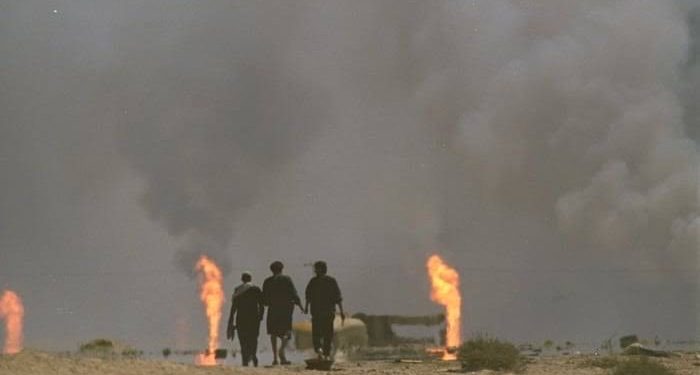Climate change is reordering the world from the rise of sea levels to the increase of natural disasters in a manner that is largely unthought of. From ecosystem impacts to economic to human societies, the consequences are far-reaching in each regard. Yet beyond its environmental impacts, climate change increasingly overshadows conflict. As Earth’s natural systems are disrupted, the precarious balance of power and resources within and between communities is being upended.
With the scarcity of natural resources, as well as unpredictable weather, a struggle for existence is very rampant. It is this competition that keeps growing which has increased tensions both inside and among different communities as the availability of some basic resources, including water, land, and food, gets minimal. The following conflict is generally multi-dimensional, and beyond environmental perspectives, it holds significant social, economic, and cultural dimensions.
Consequences from climate-driven conflict are being felt in large swathes of the world, from clashes between farmers and herders in Nigeria to the water wars of Yemen. A rising tide of violence and instability is being fomented by a change in climate. As the Earth is going to continue warming up, these conflicts are likely to rise in violence and further deteriorate an already precarious global situation.
Understanding the linkage between climate change and conflict is vital in the formulation of strategies that mitigate these impacts and, therefore, support effective response and adaptation. Understanding how climate change is a driver of conflict will have policymakers and practitioners starting to think of more holistic, sustainable approaches to conflict resolution and peacebuilding. The application could include financing climate-resilient infrastructure, a sustainable land, water, and natural resource management approach, supporting community-led participatory initiatives in peacetime, and through resilience to the manifestations of climatic changes.
The Climate-Conflict Connection
The linkage between changes in climate and conflict is often indirect, being conditioned by social, economic, and political factors. At a basic level, however, climate change fuels resource scarcity; it creates competition over the major needs of people regarding water, land, and food. Such a situation can quickly transform into violence if the governance is weak in a particular society and there is already tension within society. This fragile balance of power is disrupted, and communities are pitted against one another in desperation for survival.
For example, rural communities dependent on agriculture and pastoralism suffer livelihood disruptions due to prolonged drought or floods, consequently forcing these communities to fight over arable land and sources of water. The consequences of these conflicts can be devastating, including displacement, economic instability, and even international tensions. Social cohesion is torn apart, and cultural heritage is lost as communities are forced to flee their homes in search of safety and resources. The ripples from climate-driven conflict reach far and wide, from threatening regional stability to global security.
Climate change and conflict are issues that converge and call for holistic and sustainable responses. Addressing the root causes of climate-driven conflict requires multilevel strategies that integrate climate resilience, resource management, and conflict resolution methods. Acknowledging the interrelationships between climate change, resource scarcity, and conflict can better equip policymakers and practitioners to address those areas where climate change is most likely to both exacerbate tensions and be exacerbated by them, with a view to promoting greater stability and peace.
The Lake Chad Basin – Where Water Crises Meet Conflicts
Most poignantly, the Lake Chad Basin-one of a broad expanse of land straddling parts of Nigeria, Niger, Chad, and Cameroon-is one dramatic example of the interdependence between climate change and conflict. In the last 60 years, lake Chad lost as much as 90% of its surface area due to rising temperatures and poor water management practices. This shrinking has had great implications, enhancing competition among farmers, herders, and fishers, and even extending to increasing intercommunal violence.

The drying-up water means stiff competition for communities within the catchment area, taking advantage at one another’s detriment in a desperate survival bid. These conflicts have created an unstable environment that armed groups like Boko Haram exploit in expanding their areas of operation. It’s cynical how these groups have exploited resource scarcity for recruitment, taking advantage of desperation and frustration among affected communities. These are dire impacts, as communities displaced by violence, and by environmental degradation, put additional stress on an already fragile region.
The outlook for the Lake Chad Basin is grim, with millions of people facing the risk of food insecurity and displacement. As the lake in this basin keeps shrinking, so does the hope for this region’s very existence. This makes international action urgent to respond to the crisis, support sustainable resource management, climate resilience, and conflict resolution. Inaction will condemn the people of the Lake Chad Basin to a future of poverty, hunger, and instability, with very far-reaching consequences for regional and global security.
The Sahel: Desertification and Armed Violence
The Sahel region, sprawling over Mali, Burkina Faso, and Niger, among other countries, is yet another hotspot in terms of how increased temperatures and resources influence armed conflict. Environmental degradation and related resource scarcity have turned an uptick in violence and instability into desertification, with both temperature rise and poor land management forcing whole swathes of the Sahara to become unlivable.
With the desert advancement, pastoralist communities, who have to struggle to find grazing land for their livestock, more often clash with farmers over dwindling resources. It is not only the struggle for land and water that fuels these conflicts but also deep-seated cultural and economic differences between the two groups. These tensions, in turn, are used by armed groups-Islamist militants among them-as a means of consolidating control over the region and further destabilizing communities already too fragile. They do this by manipulating local grievances and exploiting resource scarcity to recruit new members and expand their influence.
In Burkina Faso, for instance, more than 2 million people have been displaced due to violence linked to resource disputes, setting off an alarming humanitarian crisis. It also destroyed the rich agricultural sector that this country boasted of, whereby farmers were out of livelihood and hence more prone to extremist recruitments. Confronted by an ever-deteriorating situation, the international community should swiftly act to contribute toward addressing root causes of this crisis, to support those initiatives aimed at contributing to sustainable resources management to enhance climate resilience and pave the way for conflict resolution.
The Global Ripple Effect: Migration and Resource Wars
Climate-induced conflict is not restricted to specific regions but rather has wide and far-reaching ramifications on a global scale. Rising sea levels threaten the cities situated by the coast, dislocating millions of people and creating a new wave of “climate refugees.” Many of these migrations result in tensions within the host country, as resources and infrastructures are put to a stretch. The addition of climate migrants can stress the local economies and increase competition for jobs, housing, and social services.
Where climate migration has risen, it also inflames existing social, economic, and cultural stresses in host countries. In Europe, for example, the arrival of migrants from Africa and the Middle East has fomented anti-immigrant sentiment and strained relationships between nations. Climate migration from Central America to the United States has become a contentious issue; policies on root causes are needed.
The global impacts of climate-induced conflict don’t stop at migration. Climate change is also sparking a new breed of resource wars, where nations are competing for control over water, land, and minerals in short supply. Competition over these resources can breed hostilities among nations, as well as weaken cooperation on global issues. Resource struggles can also create internal conflicts as various groups within a country struggle to have the majority of control over resources.
What are Solutions?
Therefore, the climate-conflict nexus urgently needs action through measures such as:
- Mitigation of Climate Change: Upscaling mitigation efforts, which involves reduction of emissions by the world and shifting to renewable energy. Unless mitigated, risks of climate-induced conflict will rise unchecked.
- Governance: There is a need to invest in good governance and mechanisms of conflict resolution, especially in the most vulnerable regions. In this way, trust will be built between communities, and dialogue will be fostered to prevent disputes over resources from turning violent.
- Adaptation and Resilience: Adaptation support will help build Climate Resilience. Activities may comprise sustainable farming techniques, water preservation projects, or reforestation-all deal with resource scarcity and, consequently, build resilience.
- Global Cooperation: Richer countries should take accountability for their responsibility in causing this crisis and continue to show statesmanship through providing finance and technical expertise to poorer countries. These climate finance-related initiatives such as the Green Climate Fund need to better reach out to those particular areas of conflict vulnerability.
Conclusion: A Call for Climate Justice
Climate change is not only an environmental concern but a human matter that greatly and vastly affects world peace and security. The linkage between changing climate, scarcity, and conflict will go on strengthening with rising temperatures, affecting the poorest of the poor and the most vulnerable communities throughout the world.
Any solution of climate-induced conflict must now be undertaken with a commitment to address the very causes of climate change, with an assurance of support for those most affected. Collective action is now needed to ensure that the spiral of environmental degradation and human suffering is broken, guaranteeing a fairer and peaceful future for all.
ODEDOSU Mayowa Nurudeen is a passionate and dedicated researcher, political analyst, conflict manager, and social commentator with an unwavering commitment to addressing complex societal challenges. His current research interest focuses on climate change and the intersectionality in gender equality, exploring how these critical issues intersect with governance, security, and sustainable development. Nurudeen has presented his findings at numerous national and international conferences, contributing valuable insights to the discourse on political systems, governance, and social equity.
Beyond academia, Nurudeen is deeply engaged in social impact initiatives through his leadership role at the Fonah Foundation for Humanity. At the foundation, he has spearheaded programs aimed at improving community welfare, promoting education, and empowering vulnerable groups. His work reflects a steadfast commitment to fostering resilience and sustainable development in underserved communities. As a thought leader, Nurudeen frequently participates in public discourse on pressing societal issues, offering insightful commentary on topics such as climate adaptation strategies, gender empowerment, and conflict resolution. His expertise also extends to facilitating peacebuilding initiatives and advocating for policies that promote equitable resource distribution.
In his leisure time, Nurudeen enjoys mentoring young minds, traveling, and exploring innovative solutions to global challenges. He is driven by a vision to make meaningful contributions through research, advocacy, and community engagement, all aimed at building a more inclusive and sustainable world.

